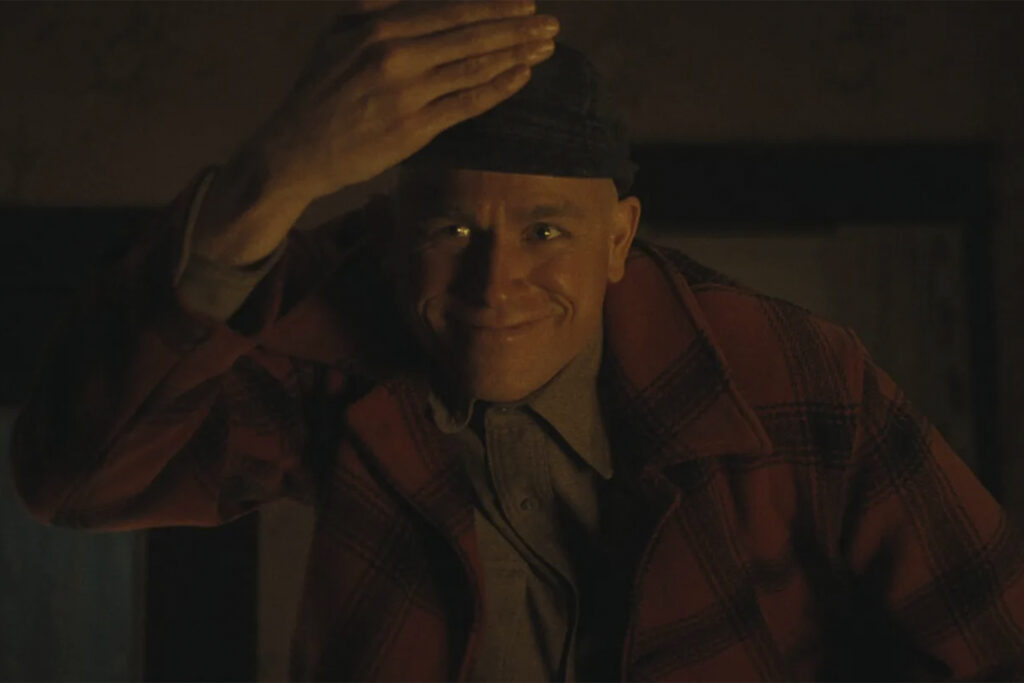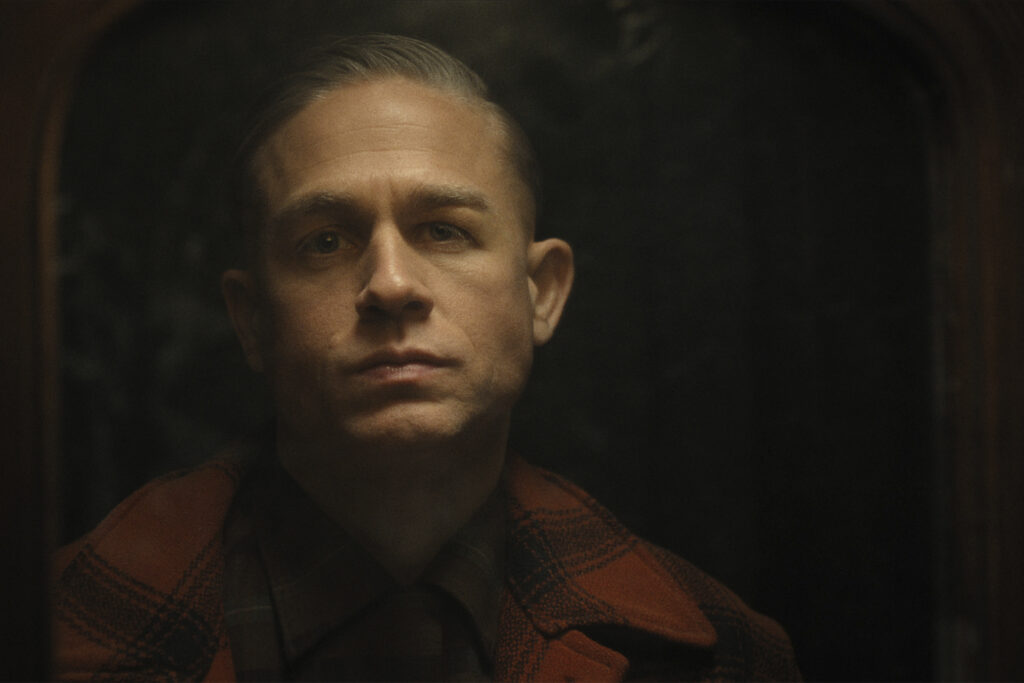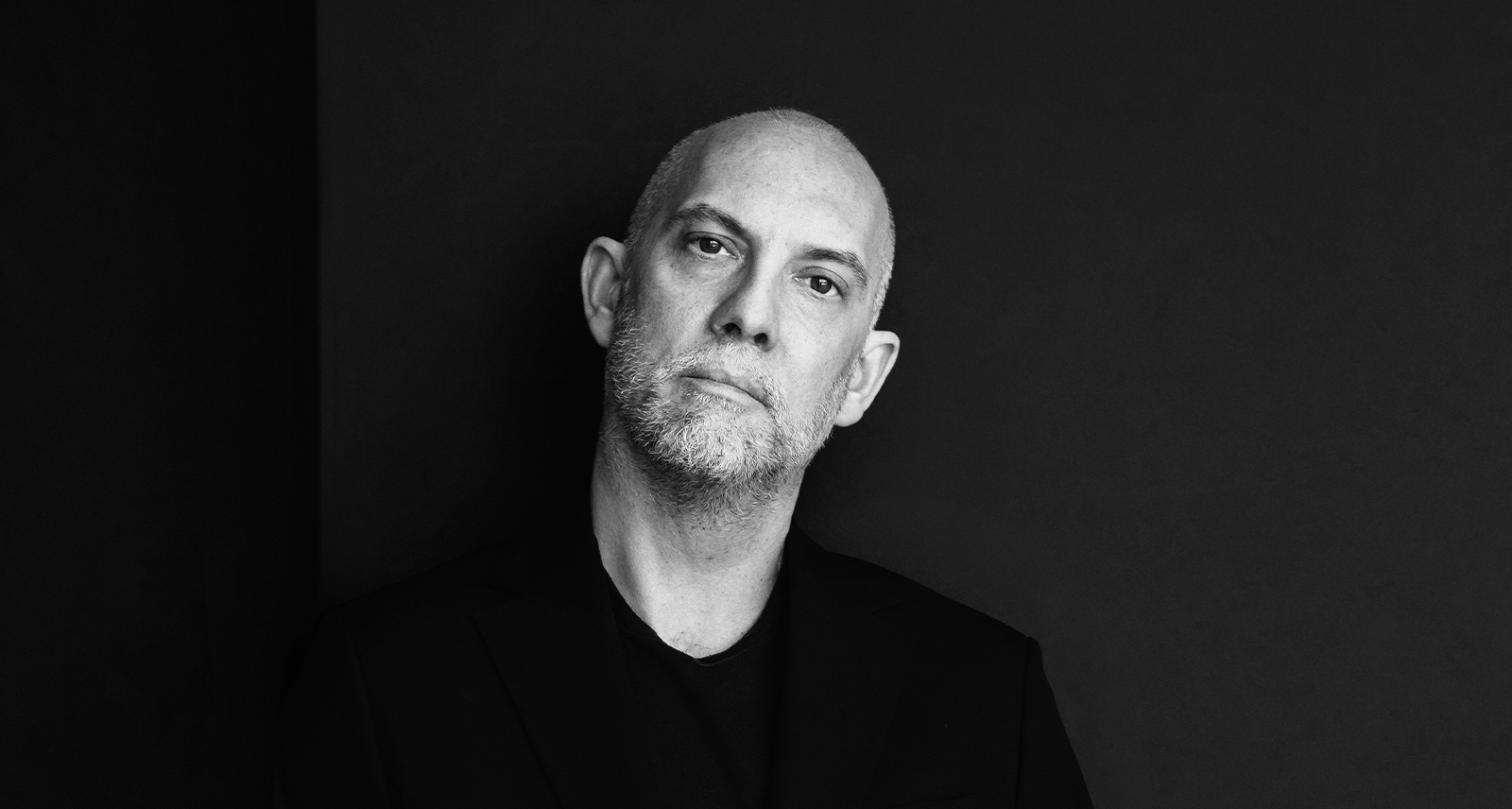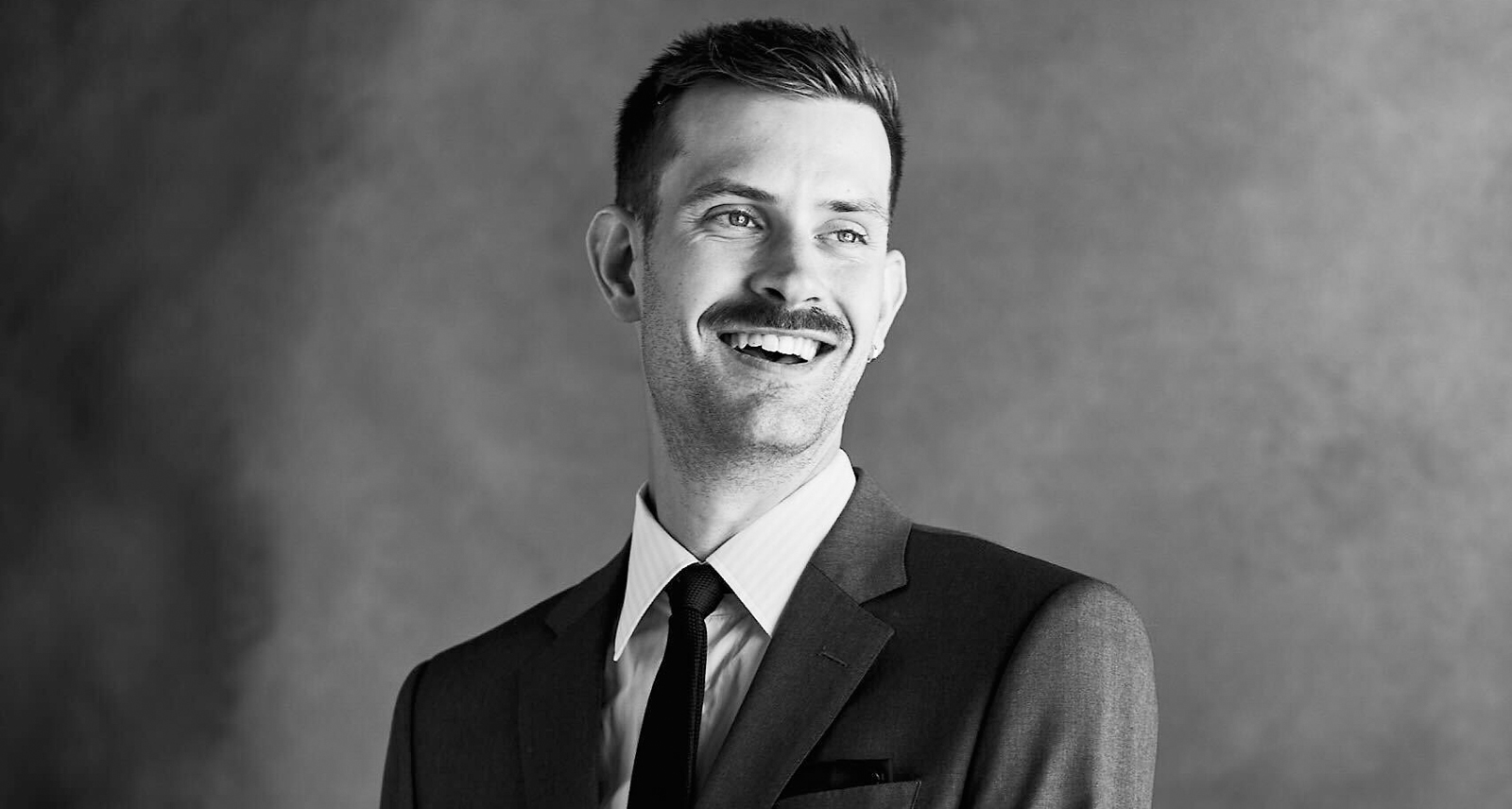Once his conversation with Ryan Murphy pivoted into an offer, Charlie Hunnam knew he was embarking on a role that was equal parts a gift and a terrifying challenge. The magnetic star, whose career arc stretches from the troubled charisma of Sons of Anarchy‘s Jax Teller to the rugged nobility of King Arthur, has always sought roles that test the boundaries of heroism. Now, the blond and blue-eyed idol has shed his signature swagger for a far more chilling challenge: embodying Ed Gein in Monster: The Ed Gein Story, which is now streaming on Netflix. This is more than a role; it’s an artistic and philosophical exorcism that stripped the actor down to a terrifying core.
Hunnam, 45, embraced the dark weight of portraying Ed Gein in the Monster series because of Gein’s profound cultural legacy. Gein was the direct inspiration for Alfred Hitchcock’s Psycho, marking the definitive turning point “where we started making films where we were the monsters.” Hunnam was fascinated not just by what Gein did, but by the difficult question: What turns a human being into a monster?
“[Monster: The Ed Gein Story] questions the nature of storytelling — the consequences of it — and really, fundamentally, why we’re drawn to tell these stories.”
Charlie Hunnam
Beyond the character study, Hunnam’s role becomes a vehicle for the show’s scathing meta-commentary on the media’s obsession with true crime. “You see the impact that media had on Ed, and then we see how a legion of filmmakers used his life as inspiration to make these dark, fictional movies that, like we said, transform the narrative of ‘monster’ from being monsters that were outside to the monsters that were inside us.”
Hunnam’s goal was not to play a caricature of evil — a “monster that feels like something outside” — but to strip away the sensationalism and find “the truth” of the man who existed. Hunnam looks directly into the camera as he delivers this unnerving message, a “mic drop moment” in which he declares: “You’re the one that can’t look away.”
Prepare to see the Hollywood heartthrob utterly dismantled. He surrenders his rugged leading-man image to crawl under the skin of America’s most infamous serial killer, and gives one of the most chilling performances to date.

Congratulations on this. I’m really happy for you. The last time we talked, we spoke about your career. This is an exciting role that we haven’t had the chance to see you in. What was it about Ed’s story that made you want to say yes?
Thank you. I had a conversation with Ryan Murphy. I met with him under the [guise] of just generally getting to know each other. He had been writing and developing this Ed Gein story and working on it for like, a couple of days leading up to when we met. He was just so excited. He was so enthusiastic and passionate about the story that he was going to tell that it was kind of infectious. So, we were talking generally about the creative process — what it means to tell stories, why he wants to tell stories, and the process of writing — which I’m very interested in. Then, he started to talk about Ed Gein. He talked for an hour and a half, just telling me who this guy was; even if you don’t know Ed specifically, the effect that he had on culture at large was enormous. He was the direct inspiration for Alfred Hitchcock’s Psycho.
Prior to Psycho, monsters were monsters. Monsters were, like, Dracula and Frankenstein and a werewolf and a vampire. [Psycho] was the turning point where we started making films where we were the monsters. The whole thing just seemed so fascinating, and it was really to explore what turns a human being into a monster — not just what Ed did, but why he did what he did. There’s this mic drop moment, like two hours in where [Murphy] said, ‘So, would you like to play it?’ And I thought about it for 15 seconds, and I went, ‘You know what, I would.’ Then I thought, ‘Oh, boy, what have I done?’
When it comes to playing a monster, do you try to find the humanity in order to play him?
I tried to find the truth. I didn’t want to play a monster, because a monster feels like something outside. It feels like a cartoon. I wanted to play a man who was deeply disturbed. So, I needed to understand [Gein], not to like, necessarily make him overly empathetic, or accessible, or anything. I wanted to play someone who was real, because this is a guy who existed, who did these things. So I wanted to try to get to the bottom of it. I wanted to figure out what the truth of the matter was. Like, what was this guy up to and why?
“I don’t feel any ambiguity about whether or not we should have made this show. I think storytelling is a vital part of the way that we understand ourselves.”
Charlie Hunnam
You do a lot of research when it comes to your roles. You did so with this, including getting the tapes, which was incredible. Because the show has such a huge fan base — everyone’s very interested and curious about the characters — what were you most nervous about tackling in real life?
I didn’t think about the success of the show because that would be too daunting. It was very flattering. Initially, when I got invited to be part of the franchise, I thought, ‘Wow, what a gift. How flattering.’ I thought the quality of these shows was just amazing. So, I was aware of what a gift it was to be included in this franchise, but then I just tasked myself with understanding [Gein] and trying to do the best job that I could do.
As you mentioned, this story flips the lens back on the audience. It examines the media consumption and all the filmmakers that have made stories and sensationalized Ed’s life. What’s your personal take on that question, after spending so much time in Ed’s world?
The show explores the consequence of media and of consuming these images. One of the things that we learned about Ed was that a real negative turning point in his journey was when he was exposed to these images coming out of the Second World War; the atrocities that happened in Nazi Germany and the graphic novel that came out after that. Ed was living in total isolation with mental health issues, and seeing that stuff left a really traumatic impact. He had to, somehow, normalize it, and he did that by actually going out and replicating some of the things that he [saw].
So, you see the impact that media had on Ed and then we see how a legion of filmmakers used his life as inspiration to make these dark fictional movies that, like we said, transform the narrative of monsters, from being monsters that were outside to the monsters that were inside us. Then, we put the camera on us. We’re perpetuating that cycle, now, making a story about Ed Gein and about Hitchcock. Now, we’re questioning responsibility and the reason that we’re [making the show], and asking you to ask yourself: ‘Why are you even watching this show that is impossibly dark?’ There’s a couple of times where I look directly into the camera. One of them is used in the trailer, where I say: ‘You’re the one that can’t look away.’ So the whole thing questions the nature of storytelling — the consequences of it — and really, fundamentally, why we’re drawn to tell these stories.

So let me ask you this. I asked Javier Bardem the same question last season. The question the show always asks, who are the real monsters? So what I want to ask you is, what do you think makes a monster in today’s society?
Abdicating your responsibility to be good. To surrender to the forces of evil. You know, like that great Aleksandr Solzhenitsyn line, ‘The line between good and evil runs down the centre of every living heart.’ You have some authority over which side of the line you step. I think that we have a responsibility to be good to each other, and we have a responsibility to bring light into the world.
I don’t feel any ambiguity about whether or not we should have made this show. I think storytelling is a vital part of the way that we understand ourselves in this really complex, difficult thing to understand with being human beings in this wacky world we live in. I think that telling stories that are difficult and about dark subject matter — just like all stories — illuminate this confusing part of the human condition that’s really difficult to understand. For us to understand it is important, so we don’t perpetuate evil and darkness in the world.
I love that you said that, because the last time we spoke, you said that you were interested in exploring the bigger questions, like: ‘What is the meaning of all this?’ Just the bigger theological, philosophical questions. I feel like, perhaps, in some way, you are addressing that with [Monster]. How do you feel that playing Ed helped with that?
“It is imperative that we confront the darkness. That is as good as a conclusion that I’ve managed to reach so far.”
Charlie Hunnam
For me, particularly, I was terrified of this. I use this analogy: it’s just an experience that I had that was important. It was like an epiphany that you have to face the darkness — there is darkness in this world — and the originating metaphor for facing the darkness is entering the cave to face the dragon, you know? Within the cave resides this fire-breathing monster that wants to kill you. But beyond the monster is the gold. If you’re compelled to get the gold — and the gold, I think, is illumination, is understanding — you have to enter the darkness and confront the thing that you’re most afraid of. It’s like the Knights of the Round Table, when they went out seeking the Holy Grail. Each end is the forest, the place that looks darkest to them. What I realized is, you get the courage to enter the darkness because you want the light. The gold represents the light, and so you go through the darkness to get into the light. And what I realized is you enter the cave, and the monster, the dragon, is you. You’re confronted only with yourself. That epiphany — that you are the thing you’re afraid of — is the gold. That’s the illumination, that’s the light, that allows you to get back out of the darkness. It’s just like the Yin Yang; you go into the darkness to find the light.
That’s a beautiful analogy. Thanks for sharing that.
That was important to me. I was in rush hour driving — and I hate rush hour driving — and I was thinking, “Why do we face the darkness?” I love the idea that what you most need to find is where you least wish to look. It is imperative that we confront the darkness. That is as good as a conclusion that I’ve managed to reach so far.
Monster: The Ed Gein Story is now streaming on Netflix.
FEATURE PHOTO BY MARK SELIGER, COURTESY OF NETFLIX.



